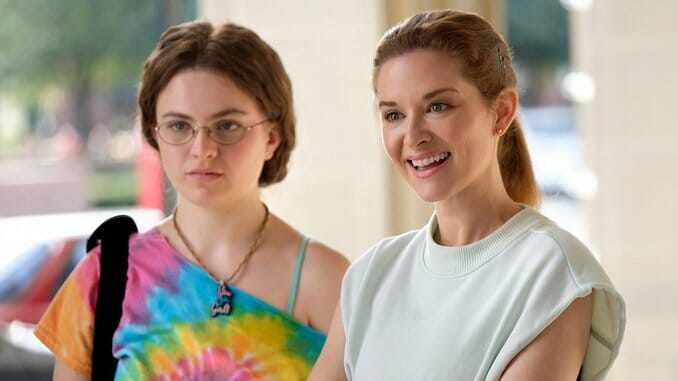Cruel Summer: Freeform’s Retro Teen Thriller Is an Intricately-Plotted Obsession Machine
Freeform might have found its next generation-spanning hit.
Photo Courtesy of Freeform
I had to give up taking notes on Cruel Summer, Freeform’s new 90s-set teen mystery series, about 2,000 words in.
For one thing, there was just so much going on, and almost none of it fell into the category of Chill to Share in a Pre-Air Review. More pressingly, though, was the fact that—to make sure I got the tiny details of any one scene right without missing any of the equally important, equally tiny details in the next—I found myself having to hit the pause button basically every 20 seconds. I mean, sure; I cut my TV teeth writing 6,000-word recaps of Pretty Little Liars. But with a full four (out of eight) episodes of Cruel Summer made available to critics for review, it quickly became apparent that such an obsessive approach wasn’t going to be sustainable.
That said, the very density that prompted me to get 2,000 words deep in a meticulous kind of madness before changing course is precisely the thing that’s likely to turn Cruel Summer into the internet’s next big generation-spanning hit. Truly, from its complex, triple-layered timeline to its compellingly intimate POV-flipping narrative structure to its viscerally accurate mid-90s details, Cruel Summer is custom-built to be an object of social media obsession.
Normally, this is the point at which I’d say something like, “for anyone who hasn’t already made Freeform their springtime TV home, here’s what that network’s ocean of promos will have told you Cruel Summer is all about…” But while a couple of slick trailers have dropped over the last several weeks, and while they’ve definitely flooded Freeform’s (and, by vertically integrated extension, Hulu’s) airwaves, the show they all seem to be advertising is so much less than the series showrunner Tia Napolitano and her team have actually made.
On the one hand, this is to be expected: The latest psychological thriller to come out of Jessica Biel’s Iron Ocean Productions (which previously brought Limetown to Facebook and The Sinner to USA), Cruel Summer takes an unapologetically convoluted approach to its overlapping she said / she said narratives. Not only does the series swap whose perspective it follows from episode to episode—getting inside the head of nerd-turned-pariah Jeanette (Chiara Aurelia) one week before jumping into golden girl-turned-trauma victim Kate’s psyche (Olivia Holt) the next—but it also does some of the most wild things with time that I’ve ever seen a TV series even attempt. Simultaneously set over the course of three consecutive summers (1993, 1994, 1995), each new step in the girls’ interconnected stories shifts and slides around every other, often in the space of a single, slyly crafted shot. (See Jeanette’s vanity mirror scene at the end of the first episode for a particularly sharp example of this temporal malleability.)
To expect a couple of trailers to successfully capture even a fraction of the experience Cruel Summer wants to give its audience, then, would be ridiculous. At the same time, the experience Cruel Summer wants to give its audience is so formally ambitious and psychologically absorbing that to think there might be any slice of its ideal audience these trailers won’t reach is a bummer.
So, for everyone reading—Freeform stans and not—this is what Cruel Summer is about:
In the one corner, you have Aurelia’s Jeanette Turner, who at any given moment is a sweetly awkward 15, or a recently popular 16, or a universally despised 17, and who may or may not be guilty of compounding another girl’s trauma. In the other corner, you have Holt’s Kate Wallis, who at any given moment is a universally beloved 15, or a freshly traumatized 16, or an acidly angry 17. In between them, you have a gulf of not-knowing—a not-knowing that at any given moment might come from one character’s inherent duplicity, the natural gaps in another’s first-hand knowledge of a situation, or the fundamental unreliability of memory even before intense emotion is involved. There are some truths that are more real for some characters, and less for others; some realities that are more tangible in one moment than they are in the next. The likelihood that one girl is lying and the other telling the truth hangs over Cruel Summer like a thundercloud, but in giving the audience just one walled-off chunk of each girl’s side of the narrative at a time, the possibility that they’re both telling a story that’s true to them is just as present.
-

-

-

-

-

-

-

-

-

-

-

-

-

-

-

-

-

-

-

-

-

-

-

-

-

-

-

-

-

-

-

-

-

-

-

-

-

-

-

-








































